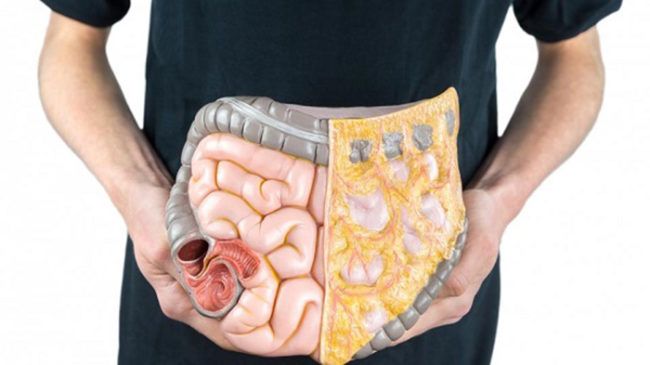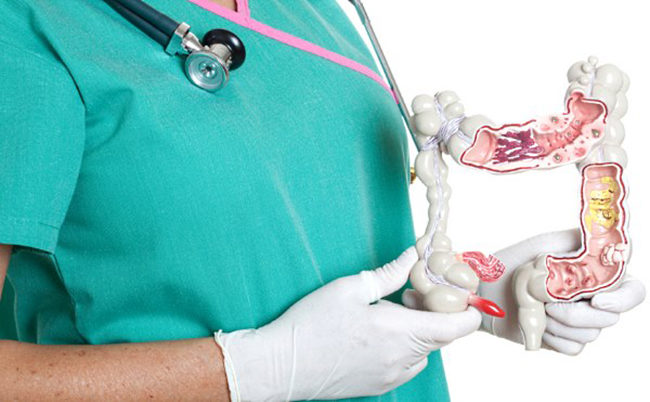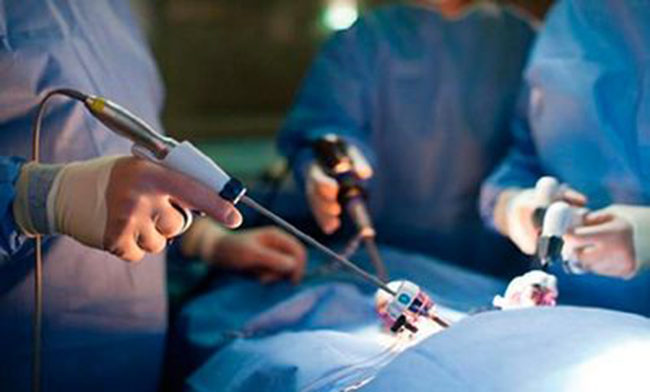Modern life is associated with a lot of stress, rush, quick and malnutrition, which can lead to rather unpleasant consequences. Most often, in such conditions, the gastrointestinal tract suffers, the diseases of which can have different etiology and manifest itself in a variety of symptoms. The simplest consequences can be gastritis and ordinary inflammation of the intestine, but in the worst performance, everything can turn into the transition of inflammatory processes into a chronic form, which in turn leads to the appearance of ulcerative colitis or non -specific ulcer colitis.
Content
- What is intestinal ulcer
- Types and forms of ulcer intestinal colitis
- Causes of ulcer intestinal colitis
- Symptoms of ulcer intestinal colitis
- Features of diagnosis of ulcer intestinal colitis
- Treatment of ulcer intestinal colitis
- Features of ulcer intestinal colitis in children
- Diet with ulcerative colitis of the intestines and folk remedies for its treatment
This disease is characterized by inflammation of some areas of the intestines, which are accompanied by ulcers and bleeding. With such symptoms, it is important to start the treatment of ulcer intestinal ulcer in time in order to avoid further complications.
In this article, we consider the main features of the disease of ulcer intestinal colitis, we note the main rules of the drug and folk treatment of the disease. We also give the nuances of proper nutrition and diet with ulcerative colitis of the intestine.
What is intestinal ulcer
Nonspecific ulcerative colitis is a rather complex and prolonged disease, the treatment of which requires great efforts from the doctor and the patient himself. Often, a complete recovery can take several years, since this disease is still poorly studied and is not always diagnosed in time. At its core, ulcerative colitis is a chronic inflammatory disease of the gastrointestinal tract and the large intestine, which is accompanied by ulcerative lesions of the mucous membrane with possible complications in the form of sepsis, necrosis, bleeding.
This is a very dangerous disease, which is important to diagnose and begin timely treatment in time, since with neglecting, ulcerative colitis can develop into cancer. This disease is detected in both men and women, while most often ulcerative colitis of the large intestine bothers people from 20 to 40 years old. At a later age, such a chronic pathology is manifested much less often. It is also worth considering that people who constantly live in megacities and developed industrial countries suffer from ulcerative colitis.
Ulcerative colitis is considered a rather old disease, the symptoms of which were first described in England around 1859. And in 1885, the English doctor showed the scientific community to the stomach layout with clearly distinguishable ulcers, which was received after the autopsy. This was the first description of the disease, which was gradually studied by scientists and doctors. In 1913, domestic scientist Kazachenko proposed the term non -specific ulcerative colitis, which all doctors and scientists currently operate on. It cannot be said that today all the nuances of this disease are known - it is not yet completely open, this is what complicates the treatment of ulcerative colitis of the intestine in adults and children.

Types and forms of ulcer intestinal colitis
Ulcerative colitis has several classifications that depend on the most diverse features and manifestations of the disease, as well as on the degree of its severity and the nature of the course. Consider the main forms and types of ulcer intestinal colitis.
Types of non -specific ulcerative intestinal colitis at the location site:
- Regional ulcerative colitis. This is perhaps the simplest form of the course of the disease. It is a local damage to the colon, expressed by inflammation of the small part of the intestine. If you do not start the treatment of regional ulcerative colitis on time, the disease can develop into a more severe form.
- Total ulcerative colitis. This is a more serious and complex form of non -specific ulcerative colitis, the treatment of which occupies a long period of time. Total ulcerative colitis appears if you do not begin to treat the regional form of the disease in time. It is an inflammation of the entire epithelial layer of the intestine, while very often the disease affects deeper tissues of the mucous membrane.
- Left -sided ulcer colitis. It is an inflammation of the rectum, which develops due to the hit of fungi and viruses into it. It proceeds rather painfully, always accompanied by constipation and severe sharp pain in the abdomen on the left side. With untimely starting treatment, serious complications occur.
- Nonspecific ulcerative proxy of the intestines. It is an inflammation of the end department of the rectum. In this case, mechanical damage to the mucous membrane is observed, which can lead to infectious complications and the probability of oncology.
Classification of ulcerative colitis according to the severity of the disease.
- Light form of ulcer intestinal colitis. With this type of the disease, the patient is quite satisfactory. There are no different complications, symptoms are an impartial soft chair and a small amount of blood in it. This form of the disease can be cured in a few weeks without the need to hospitalize the patient.
- Medium ulcer colitis. With this form of the disease, the patient also feels satisfactory, but the symptoms are more detailed. Fatigue, fever, tachycardia are observed, there are some deviations in blood tests. The symptom of this form is also a liquid stool with a brightly exposed admixture of blood in it.
- Severe form of ulcer intestinal colitis. With this degree of the disease, the patient feels extremely difficult. He has a fever, high body temperature, anemia, diarrhea. A severe form of ulcerative colitis requires urgent hospitalization and surgical intervention, since serious consequences are possible. After that, it will take a long time for rehabilitation.

There is another classification of intestinal ulcer, which is based on the degree of course of the disease.
- Chronic ulcer intestinal colitis. It is a sluggish disease, along which sudden attacks of deterioration of the condition can occur. Characterized by hereditary development factors. With this form of the disease, ulcers form on the intestinal mucosa, with inflammation of which the human condition worsens sharply, digestion is disturbed, severe pain and bloating appear, and problems with stools occur.
- Acute ulcer intestinal colitis. It is suddenly arising attacks in which the state of a person sharply worsens and all the symptoms of chronic colitis manifest themselves. If you do not start treatment on time, then dehydration may develop and a person may die.
- Recurrent ulcer intestinal colitis. It is a chronic form of ulcerative colitis with the emerging acute attacks that occur under the influence of external factors. A sign of ulcerative intestinal colitis is extensive ulcers on the mucous membrane. After prescribing treatment and the removal of the irritating factor, the disease again becomes a chronic form. If exacerbations are rare, then drug treatment of ulcerative colitis is allowed. With constant symptoms of acute colitis, a decision can be made for surgery.
- Hemorrhagic ulcer intestinal colitis. This is a rather complex form of ulcerative colitis, in which acute diarrhea provoked by a toxic stick is observed. Diarya is always accompanied by abundant blood discharge. If treatment is started untimely, a person may die.
- Ulcerative-non-chorotic colitis. This is a rather rare form of manifestation of the disease, which is inherent in newborn children with weakened immunity and impaired protective functions of the body. With this form of ulcerative intestinal colitis in children, food is poorly digested, it is behind development, it does not grow. Very often, when ignoring the symptoms, death may occur.

Causes of ulcer intestinal colitis
To know how to treat ulcerative intestinal colitis, it is primarily important to know the main causes of this disease. It is worth noting that it is still unknown to scientists, which is why ulcerative colitis of the intestine appears, which provokes its occurrence. To date, all scientists of the world are constantly working on the causes of non -specific ulcerative intestinal colitis, but in general, several hypotheses are distinguished:
- For one of the causes, the ulcer colitis is caused by environmental factors, namely an unidentified infection. This is also promoted by the weakening of immunity and protective functions of the body, which leads to the appearance of mechanical damage to the intestinal mucosa. It is through these damage that pathogens and viruses penetrate into the intestines, which leads to an inflammatory process.
- According to another version, ulcerative colitis has an autoimmune origin, according to which a person predisposed to a disease of non -specific ulcerative colitis has a gene defect. This is due to the fact that the immune system begins to produce its own antibodies that attack the intestinal epitheliocytes.
- There is another theory according to which the ulcer colitis of the intestine occurs in response to stress. The risk of the appearance of this disease increases with the patient's high exposure to mental and irritating factors, as well as reduced resistance to stressful situations. To this, weakened protection of the body's immune system is most often added, which leads to the appearance of an inflammatory process.
- The cause of ulcerative colitis is also considered a hereditary predisposition. It is believed that if close relatives once suffered from this disease, the risk of its appearance increases. To date, scientists have learned about the existence of genes that can be responsible for a hereditary predisposition to ulcerative colitis.
- Factors affecting the occurrence of ulcerative colitis include improper nutrition and taking some medications (contraceptives, certain anti -inflammatory drugs).

Symptoms of ulcer intestinal colitis
There are a large number of signs of intestinal ulcer, which depend on the form of the disease and the degree of course. Therefore, all patients have a different manifestation of ulcerative colitis. Some feel satisfactory and their symptom can only have blood vests in the feces. Others are tormented by high body temperature, fever, acute diarrhea and a large amount of blood during bowel movements. You can distinguish specific symptoms that are inherent in the ulcerative colitis of the intestine.
- The most common symptom of ulcerative colitis is the presence of bleeding from the rectum, as well as severe pain. In severe colitis, acute bloody diarrhea is observed.
- Frequent severe diarrhea is another main symptom of this disease. On average per day can be up to 20 times.
- The ulcer colitis is always accompanied by severe abdominal pain in the form of spasms.
- Sometimes constipation can be observed, although this happens quite rarely, since most often it happens the otherwise - the patient is tormented by diarrhea.
- Poor well -being, loss of appetite and strong fatigue are also the symptoms of this disease.
- With an acute form of ulcerative colitis, an increase in body temperature can be observed.
- Due to frequent diarrhea, a sharp weight loss is observed, which is also considered a sign of the manifestation of the disease.
- Symptoms also include the presence of blood, pus and mucus in feces. This is one of the most common symptoms.
- With ulcerative colitis, the intestine decreases sharply the level of hemoglobin due to constant bleeding.
- The symptom of the disease is also frequent calls for bowel movements when, during a trip to the toilet instead of feces, mucus and pus comes out.
- Sometimes there is defecation at night, when the desire to defecate sharply appears.
- Nausea, vomiting, dehydration, fever are also considered symptoms of ulcerative colitis, which characterize the intoxication of the body.

Features of diagnosis of ulcer intestinal colitis
In order to prescribe treatment correctly and determine the principles of nutrition for ulcerative colitis of the intestine, it is important to carry out the diagnosis of the disease on time. All procedures are quite unpleasant, but without them it is simply impossible to determine the exact disease, since similar symptoms are also present in other diseases of the gastrointestinal tract. Therefore, it is important to carry out laboratory and instrumental research, a selection of materials for diagnostics.
- First of all, the doctor conducts a thorough examination of the patient. For this, the skin, pallor and dryness are studied, bloating is observed. After that, the specialist must inspect the anal passage. If cracks and thickening of the mucosa are found on it, this may also indicate ulcerative colitis.
- Next, a laboratory study is carried out that will help diagnose the disease.
- A general blood test is carried out, during which increased ESR, anemia, an increase in the number of leukocytes are detected.
- One of the studies is a biochemical blood test that shows a decrease in cholesterol, albumin, signs of dehydration, which is indicated by a decrease in magnesium, sodium, chlorine.
- A coprogram is carried out - a fecal analysis, during which the presence or absence of traces of blood is clarified.
- An analysis is also carried out for C-reactive protein, the increased level of which indicates the presence of ulcer intestinal colitis.
- Be sure to carry out a tank-pop, which is necessary to exclude some diseases of the gastrointestinal tract, for example, dysentery.
- The doctor also prescribes a molecular genetic study or PCR, which allows excluding the viral and parasitic nature of the disease.
- A histological examination is also carried out, which helps to identify the smallest signs of ulcerative colitis and exclude cancer states of the gastrointestinal tract.
- During the analysis of feces, a study for fecal calprottein is also carried out. This allows you to identify the presence of inflammation in the intestines.
In addition to the above laboratory tests, instrumental are also conducted, which help to see a complete picture of the diagnosed disease.
- The most basic instrumental diagnostic method is fibroyleocolonoscopy. This procedure is an endoscopic examination of the rectum using optics. Such a study is considered the most effective and reliable and allows you to study the condition of the intestinal mucosa throughout the length. During the procedure, the material for histological examination also takes place.
- The doctor may also prescribe an ultrasound with which thickening of the intestinal walls can be identified, as well as its expansion. However, its effectiveness is much lower than that of colonoscopy.
- Irrigoscopy. This procedure means the use of a contrast matter that is introduced into the rectum and allows you to see the narrowing sites in the intestine, an uneven pattern on the mucous membrane, and small expressions.
- An MRI is also carried out, during which the study of the entire intestines and the organs located nearby is being done.
- For the diagnosis of the disease, a stomoroscopy is also carried out - an endoscope examination for detection of mucus, erosion, blood, ulcers and edema.

Treatment of ulcer intestinal colitis
Treatment of ulcerative intestinal colitis depends primarily on the severity and duration of the course of the disease. At the same time, the treatment must be comprehensive and include many factors, so it is carried out strictly under the supervision of a doctor. It is important to remove the symptoms of the disease and return the patient to normal life.
- First of all, the doctor prescribes a normal mode of life to the patient, in which all physical and emotional loads are excluded.
- Part of the treatment of ulcer intestinal colitis is considered the correct diet, according to which the doctor determines what can be eaten with ulcerative colitis of the intestine.
- The main part of the treatment is taking medications for ulcerative colitis of the intestine. The main drugs are sulfasalazine, groups of group 5-ASK, corticosteroids, as well as cytostatics. Sulfasalazine is used for mild and average in the severity of ulcerative colitis - the average dose of 3 grams, which is prescribed for 4 weeks, after which the dosage is reduced. The doctor prescribes preparations of group 5-ASK with mild and medium forms of the disease, while they are considered more mild and differ in fewer side effects than sulfasalazine. The doctor prescribes corticosteroids with a very severe form of ulcerative colitis. First, the hydrocortisone is administered intravenously, after which they switch to the pills of prednisone.
- In addition to the main drugs, the doctor prescribes drugs to eliminate symptoms. Spasmolytic, hemostatic drugs and anti -dirarean preparations are used.
- Sometimes classic treatment does not help and the doctor prescribes surgery, which can be of several types. Palliative operations are carried out if the lesions of the rectum are not more than 60%. In this case, the intestines are not completely removed. Radical operations by the doctor are prescribed with a serious intestine lesion and the impossibility of eliminating the symptoms in the form of constant bleeding. It is an operation to partially remove part of the intestine with its subsequent restoration. Another group of operations is the reconstructive surgical intervention, during which the rectum is completely removed, after which the prosthesis is installed.
- After treatment and surgery, it is important to correctly conduct the rehabilitation period during which you need to adhere to the diet and the necessary rhythm of life.

Features of ulcer intestinal colitis in children
Ulcerative colitis can also be observed in children of different ages. According to statistical data, approximately 10% of children identify symptoms of ulcerative colitis. As in adults, the disease in children is an inflammatory process of the intestinal mucosa, expressed by wounds and ulcers. In half the cases of disease in children, this is a chronic disease.
The intestinal ulcer is observed in girls and boys, while girls most often get sick in adolescence, and boys aged 6 to 18 months. A feature of the manifestation of symptoms of the disease in children is the fact that children more often suffer from severe ulcer colitis and more often than adults need surgery.
It is important to consider that the ulcerative colitis of the intestines in children is much faster. Therefore, parents should be very careful and pay attention to the slightest symptoms that can cause anxiety. The main symptoms include abdominal pain, bleeding, liquid stool, which may be the first call to go to the doctor. Having got sick in childhood, the child will be registered with the rest in the dispensary for the rest of his life and take the necessary drugs to avoid exacerbation.

Diet with ulcerative colitis of the intestines and folk remedies for its treatment
An important condition for the fight against ulcerative colitis is to hold proper nutrition, which is determined by the doctor and is based on the use of products that help eliminate diarrhea and reduce the negative effects on the intestines.
- The menu with ulcerative colitis of the intestines should consist of a large amount of fiber, warm food.
- First of all, it is allowed to eat low -fat fish and poultry, a couple of times a week you can eat veal or beef.
- You can eat only egg protein, yolk is usually not allowed.
- For breakfast, you can eat yesterday’s bread or bread with bran, but not more than 100 grams.
- You can use dairy products, but with slight fat content. This applies to cottage cheese, whole milk, natural yogurt.
- Vegetables and fruits can only be eaten in a recycled form: boiled or wiped.
- It is also important to give cereals, preference from which it is better to give oatmeal. But besides it, the use of rice, buckwheat and semolina is allowed.
- You can’t eat salty, sweet, sour and smoked, forget about coffee and strong tea, do not eat canned food, jam, pickled vegetables.

Doctors allow the use of folk treatment of ulcer intestinal colitis along with the classic medication. Often, traditional medicine allows you to improve the patient's condition and remove some symptoms, but it is impossible to completely cure with the help of medicinal herbs.
- As an example, you can use dried yarrow and sage flowers, mixed in equal proportions. Take 3 tbsp. mixtures and pour them with 1 liter of boiled water. The mixture must be infused for 4 hours and take a whole month for 1 tbsp. 7 times a day.
- You can also use tea from linden, bird codes, calendulas.
The intestinal ulcer is a rather complicated and serious disease that brings a lot of suffering and prolonged treatment. There are no special measures of prevention, it is important to see the symptoms in time and consult a doctor. Timely treatment has always been the key to a complete recovery.









Comments
a couple of years ago, there was no side of metrogils from the same problem, there were no side effects ...
I’m not a fan of peeling at all, it saves from acne of metrogil, it also smoothes it ...
Great article! ...
I take the second course of the Capsules Climafite 911. The tides went very quickly. It became calmer, irritability went away and I sleep well ...
i also noticed - it is worth nervous, everything immediately affects the face. Therefore, I try to avoid conflicts and unpleasant people. Of the creams, I like Miaflow from wrinkles - smoothes not only small wrinkles ...